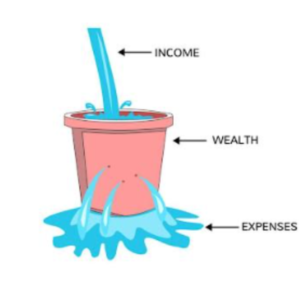
Retention in Personal Finance and Wealth Creation: The Power of Collective Strategies
If you practised in the field of insurance, retention is not a foreign strange word. But guess what, the concept applies in finance/ I am not saying that insurance is not part of finance , but is it anyway? This we shall argue on another day, or share your say in the comment section.
In personal finance and wealth creation, retention involves conserving a portion of income or assets rather than spending them immediately. Most of us try to retain it on our own by saving in various financial products, but what if there is a better tool, just from looking around, you will see some people apply this tool and way of life. This conservative strategy emphasises savings, careful budgeting, and long-term security by minimising expenses and maximising resources’s use. However, in many communities worldwide, including some in especially Asian communities all over the world let it be America, Australia, Abidjan, West Africa, strategies like collective living and shared resources offer powerful tools to achieve financial retention.
How Collective Financial Retention Works
Collective financial retention relies on community and family bonds to expand financial security. It will not work where there exists mistrust, mischief and jealousy to mention. Instead of individualistic spending, collective financial habits like group housing, pooling resources, and shared responsibilities hence allowing families or close-knit groups to build wealth more effectively, reducing costs and increasing savings. I must say that while some cultures find it easy because it is their way of life, others find it hard and conflicts often arise.
How does Group Housing work to Reducing Costs Together
Group housing is a widely used strategy for financial retention. In some cultures, including Asian and Indian communities, group living arrangements are common. This setup allows household members to share the costs of rent, utilities, and food, reducing each individual’s financial burden and generating higher disposable income. With these savings, members can reinvest, save, or put money toward common goals.
Pooling Resources: Amplifying Savings and Investment Power
In addition to living together, these households go ahead and do business together. Pooling resources brings individual incomes together, creating a larger financial base. By sharing expenses and pooling income, families or groups accumulate capital faster, opening doors to investment opportunities, such as real estate, businesses, or education. Pooling income enhances financial resilience, helping groups benefit from economies of scale and increasing each member’s financial security. A family of ten who lived together and started a business in hardware may end up growing their business tenfold and even own the building where they stay or work!!
Shared Responsibilities: Lowering Costs through Cooperation
It’s noteworthy that handling household responsibilities, like cooking and cleaning, cooperatively reduces service-related expenses. By sharing these duties, families avoid the costs of hiring outside services or eating out, reallocating these savings toward long-term financial goals. In addition, shared responsibilities also strengthen bonds within the household, instilling support, accountability, and teamwork.
Putting figures to the thoughts
Imagine a group of five university graduates in Abidjan, West Africa. After graduation, they decide to adopt collective financial retention strategies to optimize savings and build wealth together. They could implement this approach this way and the impact after five years:
Group Housing: They rent a three-bedroom apartment for 350,000 CFA Francs (hypothetical amount) per month. Each graduate pays 70,000 CFA (350,000 CFA / 5) monthly. This results in savings of 80,000 CFA each month compared to individual living costs of 150,000 CFA which can be the estimated average for individual accommodation for a one room studio.
Pooling Resources: Each member contributes 30,000 CFA monthly to cover shared expenses like utilities, groceries, and internet, totaling 150,000 CFA. By bulk buying and cost-splitting, they save around 20% on monthly expenses, resulting in savings of 30,000 CFA which is from 150,000 CFA * 20%.
Shared Responsibilities: They establish a rotation for cooking and cleaning, saving 50,000 CFA each month by not hiring outside help or eating out frequently. Okay 50,000 CFA maybe high in ABidjan, this could be reduced to 20,000 CFA in real terms or to a figure you see fit for your personal circumstances and where you live.
So what’s the Financial Impact Over Five Years
For Savings on Housing: The Monthly Savings of 80,000 CFA per person result in total savings over Five Years: 4,800,000 CFA per person (USD 7,900)
Savings on Group Expenses: For the monthly Savings of 6,000 CFA per person, the total Savings over Five Years: 360,000 CFA per person (USD 590)
And Savings on Shared Responsibilities: Monthly Savings of 50,000 CFA per person and total Savings over Five Years: 3,000,000 CFA per person (USD 4,950)
Investment Pool: They commit to pooling an additional 100,000 CFA per person monthly for a joint investment fund. After five years, this collective fund grows to 30,000,000 CFA (USD 49,500). If they invest in a small real estate project, generating 200,000 CFA monthly in rental income, which they reinvest.
Total Wealth Created
After five years, each member’s financial position has grown significantly:
Personal Savings: the total Savings from Housing, Expenses, and Responsibilities are
4,800,000 CFA + 360,000 CFA + 3,000,000 CFA = 8,160,000 CFA (USD 13,400)
Investment Contributions: the Joint Investment Fund is now 30,000,000 CFA (USD 49,500)
Ongoing Rental Income: The 40,000 CFA monthly per person from their real estate investment.
Summary of Financial Position
The Total Personal Savings amount is 8,160,000 CFA (USD 13,400). The Total Investment Returns for the investment made amounts to a Monthly Rental Income: 40,000 CFA (annualized over five years: 2,400,000 CFA or USD 3,950). Hence the Total Wealth Created After Five Years: 8,160,000 CFA + 30,000,000 CFA + 2,400,000 CFA = 40,560,000 CFA (USD 66,000)
This is hypothetical but it can be fine tuned to real situations, especially the level of income individuals may earn shortly after university and whether they are able to save 100,000 CFA per month. But you may not be freshly graduated but possibly you just moved to a new city, country because you got a new job. How would such a scenario play out for you if you lived with a friend instead of renting on your own? Of Course things like personal privacy, lifestyles have to be factored in but some people manage to do this. Then often times also people move to other places for a new beginning , not necessarily because they have a new job. For Example in almost any country , you will find a Nigerian brother or sister, the Chinese are all over , Asians are all over . We all move , for various reasons, and it is an opportunity to downsize our expenditures.
The Value of Community-Centered Financial Strategies
This example in Abidjan illustrates the effectiveness of community-centered financial strategies. Through collective living, resource pooling, and shared responsibilities, these graduates have achieved substantial savings and built an investment portfolio, creating a foundation for long-term financial security and stability. Their approach shows that financial success can often be a shared journey, with mutual support and resource retention leading to sustainable wealth-building for all involved.
Remember let not the holes in your pocket be bigger that the inlet to the pocket, otherwise it will be whipped clean each time you try to fill it. Do not forget to read the article on retiring rich and wealthy
Happy investing, Happy Living Bye
Simon Peter Mulima

I was recommended this website by my cousin I am not sure whether this post is written by him as nobody else know such detailed about my trouble You are amazing Thanks
Much appreciated